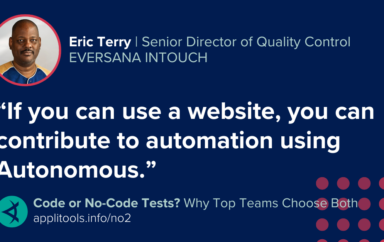One of the most challenging things about DevOps for existing development organizations, is how hard it is to get started. New development teams can grow organically with DevOps principles from day one. For these organizations DevOps is easy. But existing development shops not only do not have the option to stop everything and start over, they are slipstreaming new processes and technologies into an existing team, and an already-established delivery pipeline. However there is an exciting opportunity where QA/QE teams can become the genesis for an organization’s move to DevOps.
Now the obligatory definition. We all know that DevOps is the ethereal combination of Development and Operations through better processes and enhanced communication. This is combined with a shared objective of more frequent software releases at a better quality. This is easy to understand. Where DevOps is more nuanced is it’s execution. DevOps is a framework for building better development operations, it is a means, not an end.
The one thing that makes the framework possible is that the entire team is on the same page, and deliberate about their decisions. But if you think about the daily activities of front-end and back-end developers, Operations, Management, and QA, everyone is in the weeds. So seeing the big picture is difficult.
However, QA usually does have a holistic view of the entire environment. The quality assurance department is a hub, connected to all the developers, processes, and all application features. Versus the developers who have to maintain extreme focus in order to execute on their specific branch of code.
This is where a phenomenal opportunity arises for QA teams to help lead the organizations move to DevOps. The problem is that most QA teams are not empowered, and often don’t know what – and how much – they know.
In order for the organization to use QA as a pivot point on their way to DevOps, several things need to happen:
(1) Empower QA to recommend or dictate tools
(2) Transition QA to more test strategy
(3) Give QA greater exposure to the roadmap
(4) Change QA focus from reactive to proactive
(5) Allow QA to evangelize and educate on DevOps
Without knowing it, when the visibility of the QA team is expanded to an influence over processes and tools, the organization has already started to move into the DevOps framework – and done so without massive organizational changes, special hires, or reliance on a tool to dictate it all.
And not only does QA have the big picture of all the tools, people, and processes that comprise an application, they have tooling that makes DevOps principles of Continuous Integration and Continuous Delivery.
For example: Automated Functional Testing and Visual Testing tools take QA a step further to better CI-CD: they allow applications to be tested quickly before a release, and even after releases to spot bugs faster than ever before, especially due to acceleration of manual testing & monitoring processes.
And because they are testing applications from the customers point of view, the connection from what the users are seeing on the screen to what support and development teams see is fully transparent. This is an example of a tool that could make a significant change in the evolution of QA to DevOps, as it contributes to greater automation, faster release cycles and better software qulity across the board. Allowing QA to manage the implementation and integration of tools such as this into the testing process can positively impact the entire R&D process.
If you are an existing development shop, making the move to DevOps won’t be easy. And sometimes it’s a bit of analysis paralysis trying to figure out how. However, there is a trick in your back pocket, and that is your QA team. They have an holistic overview of the development environment, and automation that can help simplify and accelerate the move to DevOps.
To read more about Applitools’ visual UI testing and Application Visual Management (AVM) solutions, check out the resources section on the Applitools website. To get started with Applitools, request a demo or sign up for a free Applitools account.
Chris Riley is a technologist, helping organizations make the transition from traditional development practices to a modern set of culture, tooling, and processes that increase the release frequency and quality of software. He is an O’Reilly author, speaker, and subject matter expert in the area of DevOps Strategy, Machine Learning, and Information Management.





